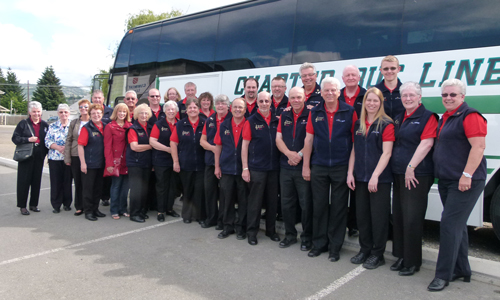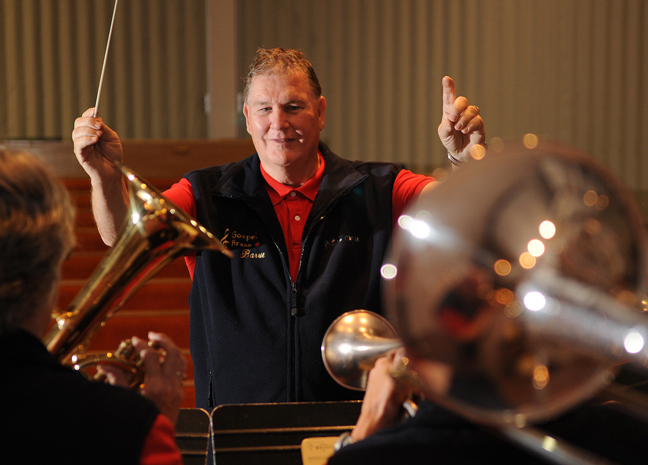“You can always hear the band's music echoing outside the chapel doors,” says Dave, a chapel worker at Mission. “The inmates just love it.”
The musicians are part of the Gospel Brass Band, a dedicated group whose volunteer chapel performances have changed lives.
“People may not want to stand and listen to people preach at them but our music gets their attention,” says Barrie Cartmell, Gospel Brass' bandmaster and founder. “When we visit a prison or a seniors' home, after we're finished, most of us end up talking to the audience, listening to their stories and even praying with them. It really is a ministry and this is one of the reasons why we enjoy doing what we do.”
In addition to playing at Mission for the past eight years, the band performs at Fraser Valley Institution, the women's prison in Abbotsford, B.C., and the minimum-security Ferndale Institution, also in Mission, B.C. Whichever facility it is, when the Gospel Brass Band comes marching in, it inevitably leads to an all-out hymn-fest.
“When you play certain hymns, you can actually see a change in the faces of the listeners,” says retired Salvation Army Major Bob Dyck, one of the band members. “You can see the difference the music is making.”
“You Can Do It!”
The band had its origins in a mission trip that eight bandspeople from the Salvation Army church in Chilliwack, B.C., took to Russia to support a friend who was a pastor there. Dubbing themselves the Gospel Brass, they were surprised to find upon their return that other Christian musicians wanted to join them, and so the group was formed under Barrie's leadership. The Gospel Brass Band's mission statement is to “glorify God and draw people to salvation through Jesus.”
While the 25 band members belong to different Christian denominations, all the music they play is from the Salvation Amy songbook. “We're probably the most active unofficial Salvation Army band there is!” laughs Barrie. But they all share a deep desire to serve God through their musical talents. Besides prisons, the band volunteers to play for nursing homes, street ministries and churches throughout the year.
“It's a blessing to hear the inmates sing with us,” says retired Salvation Army Major Sandra Haggarty, one of the trombone players in the band. She believes the federal prisons in B.C.'s Lower Mainland give the band fresh opportunities to share God's love.
One way of sharing that love is by assisting in prisoner rehabilitation.
“The Salvation Army has been involved in the Canadian prison system since the Army's inception,” Major Bob says. “We try to develop relationships inside so that there is a support network in place when it comes time for people to leave.”
Vic and Ruby Clunn have been with the band since 2001. Vic plays the baritone while Ruby plays the E-flat alto-horn. The married couple both find their reward in sharing a message of hope. Vic recalls a time he was approached by an inmate who thanked him for the inspiring music and message.
“He's now a member of The Salvation Army,” Vic marvels. “The easiest thing to say to people is, 'You can do it!' ”
Musical Pioneers
At a recent performance at Mission, 35 prisoners attended. Dave testifies to the positive impact the band has had on men throughout the years.
“People see the chapel filled with shiny brass instruments and feel invited,” he says. “It brings back warm memories of hanging around the mall at Christmastime and hearing the Salvation Army band play.”
Dave also finds the social aspect to be enriching. “The band members come in and talk with us afterward. It's a touch of community.”
Bill, an inmate at Mission Institution for several years, has found the band's performance a joyful escape.
“It transports me from the reality of being confined, to a better place for a couple of hours.”
He recalls meeting a band member who shared with him the story of a prison chaplain in his 70s who came second in the Boston Marathon. “If he can persevere and do so well at that age, it gives me hope that I can do something with the rest of my life, too!”
Roger, a French-Canadian inmate, has found participating in the hymn-sings a life-changing experience. “I've been in since 1969,” he states. “I have no family in British Columbia, so every time the band visits the chapel, they remind me that I am a full member of society in need of healthy reintegration. That means responsibility and accountability. And the band's actions model this behaviour for me.”
Roger also respects the role the band plays after they leave the prison. “When they leave, they share our experiences and our humanity with the community.”
 On the Road Again: The Gospel Brass Band embarks on another tour
On the Road Again: The Gospel Brass Band embarks on another tour
A Different Tune
People find themselves in prison for a variety of reasons. Addiction, poverty and unresolved trauma are often contributing factors. While the Correctional Service of Canada provides treatment programs to address some of these issues, such programs do not include music as a corrective intervention. Fortunately, Barrie and the Gospel Brass Band have responded to God's call to use their musical gifts toward restoring and uplifting the spirits of those in prison.
“The presentation of the gospel is the most important thing,” Major Bob says. “We do this through the hymns we sing, and there's always a devotional that goes along with our performance. Music has a way of transcending all sorts of things”
“Even a simple children's song like Jesus Love Me can get someone's heartstrings going,” agrees Barrie. “As a Salvation Army musician, I can attest how the simplest of melodies can help remind people of better days. I've heard people in prison say that the music is therapeutic for them.”
Gospel music acts as a divine intervention that gives prisoners the opportunity to live by a different, more redemptive tune than the one that led them to prison in the first place. So whether it's How Great Thou Art, Amazing Grace or Onward, Christian Soldiers, the resounding consensus among incarcerated men and women can be summed up in four words: “Play it again, Barrie!”










Leave a Comment